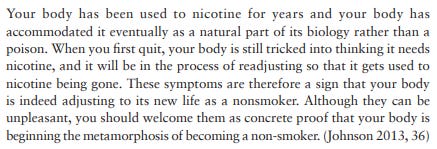Smoke & Mirrors: Revealing the Truth Behind Smoking Cessation With Psychedelics 🚬
Ready to finally kick that bad habit? Dr. Devenot's groundbreaking research delves into the transformative power of psychedelics for eliciting positive, long-lasting change.
In a groundbreaking 2014 study, psilocybin-assisted psychotherapy (P-AT) emerged as a powerful tool to aid smoking cessation.
Initial findings demonstrated jaw-dropping success rates of 80% after just six months. For comparison, the average for leading smoking cessation therapies leading up to this was just 35%.
Long-term follow-up surveys a year later showed the number of participants who stopped smoking had dropped to a still-impressive 67%.
One of the original researchers of this study has now teamed up with Dr. Neşe Devenot and others to examine the reasons behind this astounding success.
One of the biggest findings: “P-AT might be a leading way of promoting identity and personality changes within a clinical setting” (emphasis mine.)
One of the biggest factors in successfully quitting smoking is shifting your mindset to view yourself as a “non-smoker.” Not “a smoker who wants to quit,” not “a person who quit smoking,” but a person who doesn’t even identify with the habit at all.
Devenot’s team found this effect to have been a big part of pre-dose sessions.
She found 3 distinct patterns that allowed this identity reframing to take place:
Behavioral therapy programs conducted before dosing sessions
The use of a personal mantra to use whenever participants felt like smoking again
Mental exercises aimed at viewing nicotine addiction as an “outside force” and not their own identity
This was likely a vital part of the research and Devenot, et al. cite it as heavily influencing those who successfully quit at long-term follow-up.
While this may excite psychedelic researchers looking for ways to improve their success rate, it also carries a potential for grave concerns.
Let’s break down this study, explore its implications (both good and bad), and discuss why this matters for all psychedelic research.
Psilocybin + CBT: Reframing Our Self Image
Cognitive behavioral therapy (CBT) aims to replace your normal thinking process with a better one.
Frequent smokers likely don’t think much before lighting up another cigarette — CBT seeks to change this, encouraging a change in behaviors by removing the normalcy of doing them.
While sifting through the research, Dr. Devenot and her team reported some recurring themes in participants’ journal entries the day after their session with psilocybin.
Namely, many participants mentioned wanting to “quit for life,” the joy of “becoming a non-smoker,” and discussed how “simple” quitting smoking was.
The belief is that establishing these thought patterns using CBT before taking psilocybin has a dramatic impact on the success of the treatment overall.
Sometimes insights obtained from CBT work even manifested in the hallucinations participants would record in their journals.
Here are some common themes from the sessions, along with quotes from journal entries showing how they played out in hallucination form (excerpts from Dr. Devenot’s accepted manuscript, which she published in full):
1. “Don’t Give In”
Abstinence was the solution researchers pushed for; advocating one cigarette could lead to many.
2. “Quitting is Simple”
We make quitting hard, but doing so is actually a simple decision.
3. “You Are Not Your Addiction”
Nicotine is controlling your desire to smoke as an outside force. One entry mentions being overcome by a familiar shadow and realizing it’s the nicotine addiction anthropomorphized.
It continues:
4. “You Are a Non-Smoker”
Perhaps the most important change in mindset is learning to see oneself as a non-smoker.
One person uses this justification to get through withdrawal symptoms.
These helped the participants to reframe the way they thought about themselves and start their new life — the one they were supposed to be living all along — as a non-smoker.
Psychedelic Priming is Likely a Key To Successful Treatment
As the study’s authors put it, “Psychedelic-assisted identity shift represents a theoretical mechanism for the efficacy of psychedelics in the treatment of addiction.”
Since therapeutic sessions were given prior to taking psychedelics — helping participants view themselves as non-smokers — the psychedelic experience may have been more impactful than it would have without this pre-treatment.
The consequences of this could reverberate through all research and prompt deeper questions about which study methods we use in research.
With this as a starting point, it’s possible to study which CBT methods pair best with P-AT and hone therapeutic sessions within psychedelic trials.
It also presents another variable in the efficacy of psychedelics related to the ever-important setting. As one of the two biggest factors in an enjoyable experience — mindset being the other — we should spend more time on research like this to figure out how to create the best environment.
While adding a new wrinkle to the findings from 2014, they are not alone in understanding the importance of an identity shift for smoking cessation. A study involving ten people intent on quitting smoking found that transitioning to a view of themselves as non-smokers “may be necessary for successful quitting.”
In a press release from the University of Cincinnati, Devanot compares this effect to skiing after a fresh snowfall — acknowledging it’s an oversimplification. “The entrenched grooves of bad habits might not have as much pull on our skis,” she explains, adding, “so we can lay down other paths.”
Going a step further, the framework and priming might be like having a trained guide tell you the best path down.
The paper concludes with the warning, “the forms of identity shift [P-AT] enables will require new levels of ethical consideration.”
Psychedelic “Reprogramming:” A Double-Edged Sword
Priming participants for success may be the best way to ensure efficacy — but there is danger in this too.
A few of the most salient concerns include:
#1: A High Potential for the Misuse of Psychedelic Therapy
Though Dr. Devenot doesn’t cite her own article, her recent study, “Right Wing Psychedelia: Case Studies in Cultural Plasticity and Political Pluripotency,” is all about this.
Here, she and Dr. Brian Pace argue that the belief in psychedelics to increase liberal feelings and connectivity to nature ignores radical actors and their actions.
We often associate the mystical feelings of psychedelics with a desire to improve the world — and for many of us, this is likely the case. However, “Jordan Peterson, corporadelic actors, and members of several neo-Nazi organizations,” show it’s not cut-and-dry.
Rather, as the paper argues, psychedelics are politically “pluripotent” — meaning they can amplify emotion in several different directions. The increased suggestibility of minds under the influence of these drugs raises massive ethical questions.
Another study the authors cite is a 2014 assessment of suggestibility in volunteers with and without lysergic acid diethylamide (LSD).
Dr. Robert Carhart-Harris and his team discovered LSD made participants more suggestible. Those with high trait conscientiousness were noted as being especially susceptible.
Devenot includes a warning from the book Addiction Treatment: Science and Policy for the Twenty-first Century:
We are seeking to reshape the addict’s motivational system — to change the addict as a person. In some cases, this may go to the root of his or her being. Perhaps we had better hope that our techniques for doing this never become too successful because in the wrong hands….
Remember, as hippies were living it up in the 60s, the government used LSD for torture.
#2: An Overwhelming Need for Enhanced Consent
It’s not enough to tell participants what you seek to accomplish; they have to know how you’ll do it when it involves fundamental changes to identity.
Telling someone you can help them quit a habit they don’t like is different from telling them you can change the way they identify. Before fully appreciating this, we’ll need more qualitative studies of suggestibility and personality change.
Psychedelics aren’t alone in their ability to alter a person’s identity or in the ethical questions surrounding this. A 2009 study found deep brain stimulation (DBS) treatment for Parkinson’s disease may do this and called for physicians to “better inform patients with these disorders … about the relative benefits and risks.”
While another study questioned the personality effects of DBS, it still called for a better way to understand and evaluate these changes. Altering someone’s identity is different than simply alleviating a symptom or curing an illness.
#3: A Call for Increased Thoroughness In Research
The original 2014 study only had this to say about the setting of the psilocybin session:
“Participants wore an eye mask and listened to a music program through headphones.”
“[S]taff provided non-directive interpersonal support for managing psilocybin effects, but did not deliver smoking cessation-specific content.”
“In preparatory sessions participants developed their most important reasons to quit smoking into a brief motivational statement … [and] repeated their brief motivational statement for smoking cessation before each psilocybin administration.”
They did mention the programs they used for cognitive therapy sessions beforehand, along with their methodology, but too many pieces of information are missing.
Dr. Devenot’s team concluded their paper by saying:
[T]he analysis of psychedelic clinical trials should take a critical approach to set and setting that examines the impact of the full treatment context on clinical outcomes. Such an approach requires attending to the assumptions embedded in the treatment manuals and the unique psychotherapeutic modalities used alongside psychedelic substances to enact behavioral change.
How Psychedelics “Change Your Mind”
Several studies into psychedelics have pointed to potential therapeutic effects but rarely dive into the reasons for their success. Perhaps, in an attempt to overplay the success of the drug, researchers are downplaying the hard work going into each session.
This study brings up questions about every other psychedelic research study ever conducted.
Did the successful trials of veterans with PTSD actually help by getting them to no longer see themselves as a person with PTSD? What about existential anxiety, treatment-resistant depression, or any of the other reasons we’re looking at these drugs?
If so, what does this say about our other interventions for these concerns — is therapy more successful only after a shift in personal identity?
What about antidepressant medication or similar treatments, for that matter? Does believing in its efficacy to the point of considering yourself to no longer be a person with this condition while medicated make them more effective?
Hopefully, this critical new study will result in an evaluation and reporting of everything going into a psychedelic experience. Without this information, we cannot improve effectiveness across the board.
Further Reading
The free proof version of Drs. Neşe Devenot et al., research on the Johns Hopkins Study
Shifting Perceptions: The Impact of Psychedelics on Gender Identity
Dr. Devenot’s talk at Breaking Convention: Psychedelic Identity Shift: Applications of Literary Close Reading for Qualitative Research in Clinical Trials (Video)
Her other talk at Breaking Convention: You Can Be Both Pro-Psychedelics and Anti-Hype
Right-Wing Psychedelia: Case Studies in Cultural Plasticity and Political Pluripotency by Drs. Brian Pace and Neşe Devenot
Help Us Grow 🌱
Tripsitter was built by a community of psychedelic advocates — but it’s people like you that allow us to thrive.










